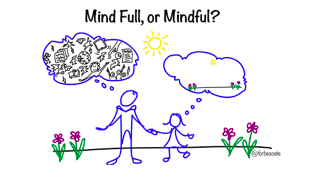 “Mindfulness” is certainly trending these days. Books and workshops are in abundance, aimed at children, adults and families.
“Mindfulness” is certainly trending these days. Books and workshops are in abundance, aimed at children, adults and families.
For some, the concept provokes rolling of the eyes, for others, curiosity, others still, an eagerness to share how helpful the practice has been for them. Perhaps in some it may provoke an urge to purchase new yoga pants and scented candles.
I believe it definitely has practical applications for healthy and happy relationships in families. Think of it as a “health habit.”
Let’s first define the term:
“The quality of being conscious or aware of something,” and, “A mental state achieved by focusing awareness on the present moment, while calmly acknowledging and accepting one’s feelings, thoughts and bodily sensations, as a therapeutic technique.”
Generally, I see mindfulness as being able to identify feelings (sometimes uncomfortable ones.) Being able to hold these feelings helps us to act — or not act — in a healthy way.
Here are some examples of mindful parenting at different developmental stages:
- CeeCee is 2-months-old and has been fussy since three weeks of age. This makes her parents anxious, maybe even a little angry. CeeCee is thriving and healthy. By practicing mindfulness, her parents are more able to accept their own feelings as “normal” and know that these feelings do not mean that they do not love her. They look forward to CeeCee having her own fussy baby in the decades to come, so that they can reminisce with her.
- Ben is 3-years-old and cries when he is dropped off at preschool. At family parties, he attaches himself like Velcro to his mother’s leg and will not engage with anyone of any age. His mother acknowledges and respects her own feelings that go back and forth between embarrassment, irritation, and too- deep sympathy for Ben in this horribly scary world. Thus her calm, measured responses to him end up making him “braver;” they do not feed into his erroneous belief about the terrible danger at a family party, and do not make him feel like a “bad boy” for being shy.
- Sara, 10-years-old, did not make the A team in soccer this year. Before she expresses any feelings around this, her parents check in on their own feelings of disappointment and anger at the coach and they restrain themselves from immediately calling the coach. Later over dinner Sara states, “I was not really one of the best players and I like the girls on the B team a lot.”
- Nick, age 16, is enraged with his parents that he cannot have a house party unsupervised by his parents. His parents are considering the following responses: 1) “What are you, crazy, you little jerk?” 2) “We are so sorry you are angry with us, so we’ve changed our minds” and/or 3) “It is all our fault we raised you to even consider such a request.” They realize all these feelings are “OK” and it is also ok for Nick to be mad. It is not their job to make him “OK” with their decision right now. They shrug, acknowledge his disappointment and move on, feeling good about their family and themselves, knowing that Nick is a good kid. Perhaps they will process this at a later time.
Mindfulness has applications across the lifespan. Young children tend to be “in the moment,” often joyful, which is a tenet of mindfulness, but they may have trouble with handling feelings that might be perceived as less positive. Young children can learn to “stand next to” feelings of anger, sadness, disappointment and fear, and then move on. The elderly, sometimes looking at the past, are perhaps a bit frightened about the future. A practice of mindfulness can be a comfort to them at their stage of growth.
Hanna Rosin, in a humorous piece in Slate, wonders if the concept of mindful parenting just identifies another way for parents to fail (e.g., I forgot to bake for the bake sale AND I forgot to be mindful with the kids yesterday.) She raises a valid point in a funny and engaging way. But I believe that, in the long run, a bit of this practice in family life will do the opposite; it will relieve pressure on kids and parents, and perhaps grandparents as well.